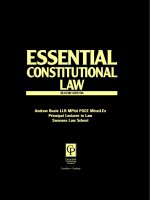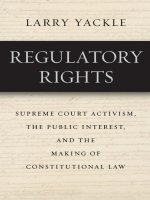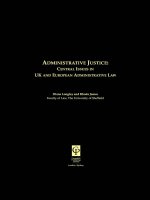Constituting Equality gender equality and comparative constitutional law doc
Bạn đang xem bản rút gọn của tài liệu. Xem và tải ngay bản đầy đủ của tài liệu tại đây (2.3 MB, 382 trang )
This page intentionally left blank
constituting equality
Gender Equality and Comparative Constitutional Law
Constituting Equality addresses the question, how would you write a constitution if
you really cared about gender equality? The book takes a design-oriented approach
to the broad range of issues that arise in constitutional drafting concerning gender
equality. Each section of the book examines a particular set of constitutional
issues or doctrines across a range of different countries to explore what works,
where, and why. Topics include (1) governmental structure (particularly electoral
gender quotas), (2) rights provisions, (3) constitutional recognition of cultural or
religious practices that discriminate against women, (4) domestic incorporation of
international law, and (5) the role of women in the process of constitution making.
Interdisciplinary in orientation and global in scope, the book provides a menu for
constitutional designers and others interested in how the fundamental legal order
might more effectively promote gender equality.
Susan H. Williams is the Walter W. Foskett Professor of Law at the Indiana Uni-
versity Maurer School of Law, where she also serves as the Director of the Center
for Constitutional Democracy. Professor Williams graduated from Harvard Law
School, where she served as the Supervising Editor of the Harvard Law Review and
then clerked for Hon. Ruth Bader Ginsburg on the U.S. Court of Appeals for the
District of Columbia Circuit (1985–1986). She has been a visiting faculty member
at the University of Paris II (Panthe´on-Assas) and a Fellow at Wolfson College,
Cambridge University, and at the European University Institute in Fiesole, Italy.
Professor Williams is the author of Truth, Autonomy, and Speech: Feminist
Theory and the First Amendment (2004). She has published numerous articles
on issues related to freedom of speech, feminist theory, freedom of religion,
and civil society. Her writing has appeared in the Stanford Law Review ,the
University of Pennsylvania Law Journal,theBerkeley Women’s Law Journal,the
Yale Journal of Law and Feminism,andtheMichigan Journal of Gender and Law.
At Indiana Law, Professor Williams teaches Property, First Amendment Law,
Feminist Jurisprudence, Constitutional Design, and a seminar on Comparative
Constitutional Law on Gender Equality. Professor Williams is actively involved
in constitutional advising for the Burmese democracy movement. She serves as a
constitutional advisor to the Women’s League of Burma, the Federal Constitution
Drafting Coordinating Committee, and the state constitution drafting committees
of all of the states of Burma. In this capacity, she teaches workshops, produces
educational materials, and works on drafting and revising constitutional language.
Constituting Equality
gender equality and comparative
constitutional law
Edited by
SUSAN H. WILLIAMS
Indiana University
CAMBRIDGE UNIVERSITY PRESS
Cambridge, New York, Melbourne, Madrid, Cape Town, Singapore,
São Paulo, Delhi, Dubai, Tokyo
Cambridge University Press
The Edinburgh Building, Cambridge CB2 8RU, UK
First published in print format
ISBN-13 978-0-521-89836-2
ISBN-13 978-0-511-59638-4
© Cambridge University Press 2009
Information regarding prices, travel timetables, and other factual information
given in this work are correct at the time of first printing, but Cambridge
University Press does not guarantee the accuracy of such information thereafter.
2009
Information on this title: www.cambrid
g
e.or
g
/9780521898362
This publication is in copyright. Subject to statutory exception and to the
provision of relevant collective licensing agreements, no reproduction of any part
may take place without the written permission of Cambridge University Press.
Cambridge University Press has no responsibility for the persistence or accuracy
of urls for external or third-party internet websites referred to in this publication,
and does not guarantee that any content on such websites is, or will remain,
accurate or appropriate.
Published in the United States of America by Cambridge University Press, New York
www.cambridge.org
eBook
(
NetLibrar
y)
Hardback
This book is dedicated to Justice Ruth Bader Ginsburg, who has
been for me, as for so many others, a mentor, a role model, and
an inspiration.
Contents
List of Contributors page ix
Acknowledgments xv
Introduction: Comparative Constitutional Law, Gender
Equality, and Constitutional Design 1
Susan H. Williams
section one: structure
1 Gender Quotas in Politics – A Constitutional Challenge 29
Drude Dahlerup and Lenita Freidenvall
2 Equality, Representation, and Challenge to Hierarchy:
Justifying Electoral Quotas for Women 53
Susan H. Williams
section two: rights
3 More than Rights 75
Helen Irving
4 Perfectionism and Fundamentalism in the Application of
the German Abortion Laws 93
Mary Anne Case
5 Moral Authority in English and American Abortion Law 107
Joanna N. Erdman
vii
viii Contents
section three: culture/religion and gender
equality
6 Must Feminists Support Entrenchment of Sex Equality?
Lessons from Quebec 137
Beverley Baines
7 Deconstructing the East/West Binary: Substantive Equality
and Islamic Marriage in a Comparative Dialogue 157
Pascale Fournier
8 Conflicting Agendas? Women’s Rights and Customary Law
in African Constitutional Reform 173
Aili Mari Tripp
9 Gender Equality and the Rule of Law in Liberia: Statutory
Law, Customary Law, and the Status of Women 195
Felicia V. Coleman
section four: constitutions and international law
10 Constitutional Incorporation of International and
Comparative Human Rights Law: The Colombian
Constitutional Court Decision C-355/2006 215
Ver
´
onica Undurraga and Rebecca J. Cook
11 Guatemalan Transnational Feminists: How Their Search for
Constitutional Equality Interplays with International Law 248
Christiana Ochoa
section five: women in the process of constitution
making
12 Women in the Constitutional Drafting Process in Burma 273
Thin Thin Aung and Susan H. Williams
13 Founding Mothers for a Palestinian Constitution? 290
Adrien Katherine Wing and Hisham A. Kassim
Conclusion: Gender Equality and the Idea of a Constitution:
Entrenchment, Jurisdiction, and Interpretation 312
Vicki C. Jackson
Index 351
List of Contributors
Thin Thin Aung is the Secretary for Education and Advocacy of the Fed-
eral Constitution Drafting and Coordinating Committee (FCDCC) of the
Burmese democracy movement. She also serves as the Coordinator of the
Women’s Political Empowerment Program for the Women’s League of Burma
(WLB) and as a member of the Central Executive Committee of the Women’s
Rights and Welfare Association of Burma (WRWAB). She participated in the
nationwide democratic uprising in Burma in 1988 and left the country for
India after the military coup in the same year. She lived in a refugee camp at
the India-Burma border for two years and then moved to New Delhi in 1990
to seek refugee status from the UNHCR office. She has been living in exile
in India for the last 19 years and working for the restoration of democracy in
Burma and for women’s rights and empowerment.
Beverley Baines is a Professor of Law and the Head of the Women’s Studies
Department at Queen’s University, Canada, as well as being cross appointed
to the School of Policy Studies. She co-edited The Gender of Constitutional
Jurisprudence with Ruth Rubio-Marin (Cambridge University Press, 2004). Her
recent constitutional law scholarship focuses on how the Canadian Charter
of Rights and Freedoms frames rights conflicts between religious freedom
claimants and sex equality proponents in the contexts of polygamy, faith-based
family arbitration, and multicultural accommodation.
Mary Anne Case is the Arnold I. Shure Professor of Law at the University
of Chicago. She was the 2006–2007 Crane Fellow in Law and Public Affairs
at Princeton University. Her scholarship to date has concentrated on the
regulation of sex, gender, and sexuality, although she also has done work on
other aspects of constitutional and comparative law and on the early history of
feminism. She has taught at the University of Virginia and studied the German
ix
x List of Contributors
abortion laws as a Bosch Public Policy Fellow at the American Academy in
Berlin.
Felicia V. Coleman is presently a lawyer in private practice in Monrovia,
Liberia. She served as a Circuit Court Judge for the 1st Judicial Circuit Crim-
inal Assizes “A,” and then as an Associate Justice of the Supreme Court of
Liberia during the interim government. Her judicial tenure ended on January
16, 2006, with the election and inauguration of the government of Madam
Ellen Johnson Sirleaf. After stepping down from the bench, she served on the
task force that drafted the Law Reform Commission Act that is presently before
the National Legislature. She currently serves as a consultant for the drafting
of the Act on the Prohibition of Chemical Weapons for Liberia. During her
ten-year career as a trial lawyer, she also served as legal advisor to the Vice
President of the Interim Government of National Unity from 1991 to 1993.
Before embarking on her legal career, she worked as a registered nurse.
Rebecca J. Cook holds the Faculty Chair in International Human Rights in
the Faculty of Law at the University of Toronto. She is ethical and legal issues
co-editor of the International Journal of Gynecology and Obstetrics and serves
on the editorial advisory boards of Human Rights Quarterly and Reproductive
Health Matters. Her most recent book, written with B. M. Dickens and M. F.
Fathalla, is Reproductive Health and Human Rights: Integrating Medicine,
Ethics and Law (Oxford University Press, 2003).
Drude Dahlerup is a Professor of Political Science at Stockholm University.
She has published extensively on women in politics, social movements, and
feminist theory, including, for example, The Redstockings: The Development,
New Thinking and Impact of the Danish Redstocking Movement 1970–1985,
volumes I–II. (Gyldendal, 1998) (in Danish) and The New Women’s Move-
ment: Feminism and Political Power in Europe and the USA (Editor) (Sage,
1986). Her latest book, Women, Quotas and Politics (Editor) (Routledge, 2006),
is the first global study of the new trend of using gender quotas in poli-
tics. See the Web sites www.quotaproject.org (with International IDEA) and
www.statsvet.su.se/wip.
Joanna N. Erdman is a Co-Director of the International Reproductive and
Sexual Health Law Programme and the Director of the Health Equity and Law
Clinic in the Faculty of Law at the University of Toronto. Joanna has published
in the areas of access to reproductive health care, Canadian and comparative
health policy, and human rights law. Her primary scholarship concerns sex
and gender discrimination in the regulation, structure, and financing of health
systems.
List of Contributors xi
Pascale Fournier is an Assistant Professor in the Faculty of Law and associate
researcher at the Human Rights Research and Education Centre at the Uni-
versity of Ottawa. She served as a law clerk to Justice Claire L’Heureux-Dub
´
e
at the Supreme Court of Canada and taught at the McGill Faculty of Law
(Canada), the Institute for Women’s Studies and Research (Iran), the Univer-
sity for Peace (Costa Rica), and the State University (Haiti). Both her research
and her teaching focus on law and religion, comparative family law, women
and Islam, and international gender law. She currently serves on the Board of
Directors for Canada World Youth, la Fondation Paul G
´
erin-Lajoie, and the
National Network on Environments and Women’s Health.
Lenita Freidenvall is a senior lecturer and researcher in the Department of
Political Science at Stockholm University, Sweden. She received her Ph.D. in
political science on the topic “Every Other One for the Ladies: On Women’s
Political Representation, Gender Quotas, and Candidate Selection in Swedish
Politics 1970–2002.” She has published widely on women and politics, gender
quotas, and candidate selection. Her most recent works are Electoral Gen-
der Quota Systems and Their Implementation in Europe: Report to the Euro-
pean Parliament (2008), together with Drude Dahlerup and in cooperation
with International IDEA, and Kvotering [Quotas](2008), together with Drude
Dahlerup. She has also written reports on constitutional reform and gender
on behalf of the Swedish National Working Commission on Constitutional
Reform.
Helen Irving is a Professor of Law in the Faculty of Law at the University
of Sydney, where she teaches Australian and comparative constitutional law
and theory. In 2005–2006, she was a Visiting Professor at Harvard Law School.
She is the author and editor of many works, including To Constitute a Nation
(Cambridge University Press, 1997/1999) and, most recently, Gender and the
Constitution: Equity and Agency in Comparative Constitutional Design (Cam-
bridge University Press, 2008).
Vicki C. Jackson is a Professor of Law at Georgetown University Law Center.
After graduating from Yale Law School, she served as law clerk to Thurgood
Marshall, Associate Justice, U.S. Supreme Court. She is co-author with Mark
Tushnet of a coursebook on comparative constitutional law (now in its second
edition); she serves as an Articles Editor for I·CON, the International Journal
of Constitutional Law, and as a vice-president of the International Associa-
tion of Constitutional Law. Her scholarship addresses federalism, sovereign
immunity, freedom of expression, judicial independence, comparative con-
stitutional law, transnationalism, and gender equality. Among other public
xii List of Contributors
service activities, she was a co-chair of the Special Committee on Gender of
the D.C. Circuit Task Force on Gender, Race and Ethnic Bias (1992–1995).
Hisham A. Kassim is an associate at Kalbian Hagerty, LLP, in Washington,
DC. His practice includes international commercial transactions and
sovereign representation. He also served as an intern at the Jordan Securi-
ties Commission in Amman, Jordan. Author of numerous publications on the
personal status codes of Palestine and Tunisia, he received his B.A. from the
University of Virginia in 2003, and his J.D. from the University of Iowa College
of Law in 2007.
Christiana Ochoa is a Professor of Law at Indiana University Maurer School
of Law. She has worked for numerous human rights organizations throughout
Latin America, including the Colombian Commission of Jurists, the Center
for Justice and International Law, Human Rights Watch, and FUNDECI.
Professor Ochoa has also taught at the Universidad de los Andes in Bogot
´
a,
Colombia. Her research currently focuses on the customary international law
of human rights and argues for the inclusion of individuals in this traditionally
state-centered area of international law.
Aili Mari Tripp is a Professor of Political Science and Gender and Women’s
Studies at the University of Wisconsin–Madison. She is co-author (with Isabel
Casimiro, Joy Kwesiga, and Alice Mungwa) of African Women’s Movements:
Transforming Political Landscapes (Cambridge University Press, 2009). She
has also published Women and Politics in Uganda (2000) and Changing the
Rules: The Politics of Liberalization and the Urban Informal Economy in Tan-
zania (1997) and has edited several books, of which the most recent is Global
Feminism: Transnational Women’s Activism, Organizing, and Human Rights
(with Myra Marx Ferree) (New York University Press, 2006). She is co-editor of
the American Political Science Association’s journal Politics & Gender and the
book series Women in Africa and the Diaspora with University of Wisconsin
Press.
Ver
´
onica Undurraga is the Director of the Women’s Program at the Human
Rights Center, based in the Law School of the University of Chile. She is a
member of the Latin American Women Law Professors Network (Red Alas)
and the board of Fundaci
´
on Pro Bono. She received her J.D. from the Uni-
versidad de Chile and her LL.M. degree from Columbia University. She is
currently a J.S.D. candidate at the Universidad de Chile.
Susan H. Williams is the Walter W. Foskett Professor of Law and the Director
of the Center for Constitutional Democracy at Indiana University Maurer
List of Contributors xiii
School of Law. In her work with the Center, she advises leaders and reformers
in several countries about issues of constitutional drafting in diverse societies,
particularly issues concerning gender equality and individual rights. She is the
author of numerous articles and of Truth, Autonomy, and Speech: Feminist
Theory and the First Amendment (New York University Press, 2004). She
teaches courses on Property, Feminist Jurisprudence, Freedom of Speech and
Religion, Constitutional Design, and Comparative Constitutional Law.
Adrien Katherine Wing is the Bessie Dutton Murray Professor at the Univer-
sity of Iowa College of Law, where she has taught for 22 years. Additionally,
she is the Associate Dean for Faculty Development as well as the Director
of the Summer Abroad Program in Arcachon, France. Author of more than
100 publications, she is editor of Global Critical Race Feminism (New York
University Press, 2000). Her course load includes International Human Rights,
Law in the Muslim World, and U.S. Constitutional Law.
Acknowledgments
This book is the result of the efforts of many people over several years, and I
would like to offer thanks to them here. The book grows out of a conference
called “Constituting Equality,” which was held at Indiana University Mau-
rer School of Law in March 2007. Dean Lauren Robel generously provided
both financial and moral support for the conference, allowing us to invite
participants from all over the world. Those participants included a number
of people, including A. Jasmine Rassam, Bill Scheuermann, Carol Green-
house, Elisabeth Zoller, Jeannine Bell, Blake Puckett, and Dawn Johnsen,
whose contributions to the conversation at the conference enriched all of the
chapters in this book. Nikki Rolf provided able administrative support for the
conference.
I would also like to thank the research assistants who have worked on
this book, including Andrea Button, Ross Eberly, Catherine Clements, and
Christina Clark. My secretary, Rita Eads, has spent untold hours working on
the manuscript and trying to teach me the more esoteric aspects of computer
formatting. And, our editor at Cambridge University Press, John Berger, has
been unfailingly patient and helpful.
Finally, my deep thanks go to my husband, David, and to our children, Ben
and Sarah. Their love and support make all things possible.
Susan H. Williams
Bloomington, Indiana
November 2008
xv
constituting equality









